Illinois Baptist
Why Illinois needs more churches

Table Talk with Dennis Conner P. 13
A survey of IBSA churches conducted late last year showed desire for increased assistance with evangelism, discipleship, and leadership. Of special interest to respondents in the survey was ministry that reaches the next generation—students, young adults, and families with children. Now a separate report tallied in January confirms their concerns. Illinois churches were down in several key areas, according to the 2016 Annual Church Profiles (ACP).


“For our statewide family of churches,” IBSA Executive Director Nate Adams said, “2016 was a reminder that our Baptist faith and message is increasingly counter-cultural, and that now more than ever we must be creative, winsome, and determined to reach and disciple the people of our Illinois mission field.”
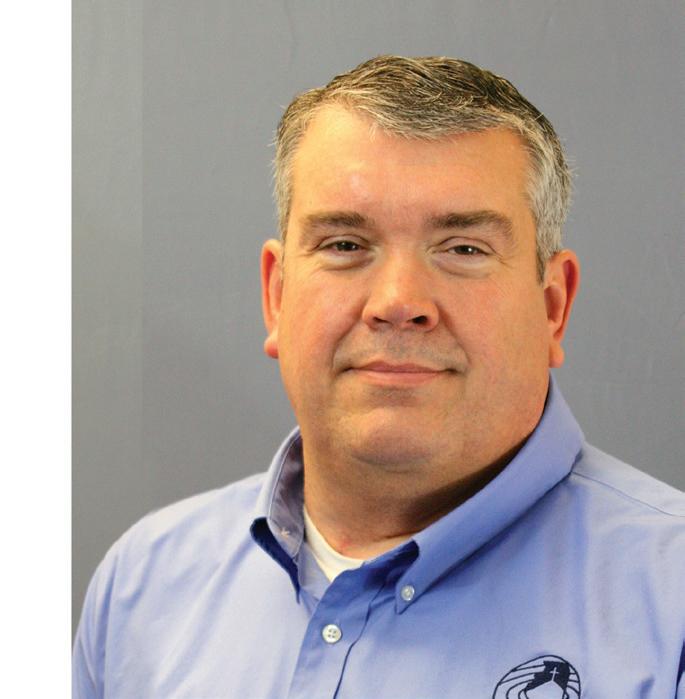





In the “down” column are membership (from 193,972 in 2015 to 184,545 in 2016) and average Sunday morning worship attendance (from 76,344 to 71,022). Sunday school enrollment was down (from 83, 552 to 79,912), but attendance was up by almost 1,000.

Nonprofit Organization U.S. POSTAGE PAID Peoria, Illinois Permit No. 325
FEBRUARY 06, 2017 Vol. 111 No. 02 News journal of the Illinois Baptist State Association Visit our new website IllinoisBaptist.org See page 3 for more addresses. IB MISSIONS Up on the roof Prayer for the city P. 14 Cooperative Program It plays in Peoria P. 11 Global and local Your church’s CP giving in 2016 Special Section B in focus
How a leader’s personal development affects a church’s size and direction 2016 Annual Church Profile In times
Ministry must be ‘creative, winsome, determined’ P. 3
Growth Potential
like these
The first two weeks The president & Southern Baptists P. 4
Team report from the Illinois Leadership Summit P. 7-10
NATE ADAMS
CONVENTIONAL WISDOM
Snapshots from the world of Illinois Baptists
“…For many Americans, Bible reading is a pillar of their faith. Most Americans though, are not satisfied with their current level of Scripture reading.”
– Barna Research in the word?
Barna asked U.S. adults, “Do you wish to read the Bible more or not?”
Yes
61% 36% No
Don’t know
61 3%
Becoming better readers
People whose personal use of the Bible has increased in the last year answered the question: “What compels greater Bible engagement?”
Came to understand it as an important part of my faith journey
Difficult experience caused me to search for direction/answers
Significant changes in my life (marriage, birth of child, etc.)
Downloaded the Bible onto my smartphone or tablet
Saw how the Bible changed someone I know for the better
Went to a church where Bible became more accessible to me
Someone I know asked me to read the Bible with them
Media conversations around religion and spirituality
Giving by IBSA churches as of 1/27/17
– Barna Research, Jan. 2017
$322,647
Budget Goal: $484,615
Received to date in 2016: $254,089
2017 Goal: $6.3 Million
The Illinois Baptist staff
Editor - Eric Reed
Graphic Designer - Kris Kell
Contributing Editor - Lisa Sergent
Editorial Contributor - Meredith Flynn
The general telephone number for IBSA is (217) 786-2600. For questions about subscriptions, articles, or upcoming events, contact the Illinois Baptist at (217) 391-3119 or IllinoisBaptist@IBSA.org

The Illinois Baptist is seeking news from IBSA churches. E-mail us at IllinoisBaptist@IBSA.org to tell us about special events and new ministry staff.

POSTMASTER: The Illinois Baptist is owned and published every three weeks by the Illinois Baptist State Association, 3085 Stevenson Drive, Springfield, Illinois 62703-4440. Subscriptions are free to Illinois Baptists. Subscribe online at IBSA.org

The power of one
This is a time of year when we at IBSA do a lot of evaluating, not only of our staff’s efforts, but also of the overall health dynamics of churches. An outstanding 95% of IBSA churches completed annual church profile reports for 2016, and this gives us a wealth of information to study.
Like every year, some churches thrived last year and others struggled, so it’s possible to overgeneralize. But looking at the broad stroke data for 964 churches and missions (up seven from the previous year), it’s reasonable to say that some ministry areas such as leadership development and Sunday School participation were up, while others such as church planting and missions giving were down, at least compared to the previous year.
Of all the “down” areas, though, none concern me more than our churches’ overall baptism number, which dropped more than 11% in 2016, to 3,953. The number of churches reporting zero baptisms increased by over 10%, to 352, meaning that more than a third of IBSA churches did not baptize anyone last year.
A few days ago, one pastor asked me how things were going, and the first burden I found spilling out of my heart was the decline in church baptisms. He nodded his head in empathy and agreement. “I know we were down in our church last year,” he acknowledged.
But what he said next truly encouraged me. “So we are really getting after that this year. We have set a baptism goal, and we have evangelism training planned. But we also have set goals as a church for the number of gospel presentations we will make, and the number of spiritual conversations we will seek to have, believing that those will then lead to gospel presentations.”
He went on to tell me how each leader and church member was being challenged to look for these opportunities, and that they were reporting them through Sunday school classes and other ways.
That same week, a young pastor wrote me an e-mail, thanking me for how two of our IBSA staff members had specifically helped and encouraged his small church. He admitted that in the past he had questioned how much his church’s Cooperative Program giving helped struggling churches, compared with church plants. Now, in his first senior pastorate, he had experienced firsthand the practical ministry support that state staff provide. Others in his association felt the same, he said, and were planning to join him in increasing their Cooperative Program giving this next year.
What struck me about both these conversations, and both these pastors, was the positive power of one voice, one commitment. One pastor looked at a lower baptism number and said, “We will not be satisfied with that. Here’s what we’re going to do.” Another pastor took a fresh look at the value of cooperative missions giving and said, “We can do more.”
So often it just takes just one voice, one commitment, one resolution of faith to turn things around. I think of Noah, and David, and Elijah, and Nehemiah, and other Old Testament heroes. I think of Peter’s boldness and Paul’s resilience in the New Testament. And of course I think of Jesus, not only on the cross, but also in eternity past, saying to the Father, “This shall not stand. I will do what it takes to make this right.”
Today, each of those pastors is using his own power of one to lead and inspire his church to a better place, regardless of the past, or what happened last year. In doing so, they reminded me how much can change when one person simply refuses to accept the status quo.
Nate Adams is executive director of the Illinois Baptist State Association. Respond at IllinoisBaptist@IBSA.org.

2 IBSA. org Illinois Baptist
the cooperative program
Just one voice, one commitment, one resolution of faith can turn things around.
67% 26% 20% 18% 14% 12% 10% 5%
From the front: 2016 acp report
Continued from page 1
But most noteworthy is the change in baptisms reported by Illinois Baptist churches.
In 2016, IBSA churches baptized 3,953 people, down from 4,400 the previous year. On average, churches baptized 4.1 people each. But 352 of IBSA’s 964 churches reported zero baptisms. Churches that did report baptisms averaged 7.2 baptisms per church.
“The IBSA Evangelism Director position was vacant from the second half of 2015 through all of 2016,” Adams noted. After interviewing more than a half dozen candidates for the post, Adams asked Associate Executive Director Pat Pajak to lead evangelism efforts in Illinois. Pajak previously led the Church Strengthening Team (now the Church Resources Team) and later the Church Consulting Team. His passion is sharing Christ with lost people, and already Pajak is bringing that enthusiasm to Illinois churches, asking for—and getting—commitments to share Christ and to lead people to baptism in the churches where he preaches.
In addition to Pajak’s new assignment, Jack Lucas has joined the IBSA Church Resources Team to lead next-generation ministry. He started Feb. 1, coming from roles as pastor of Pleasant Hill Baptist in Mt. Vernon and part-time IBSA zone consultant. Lucas has led VBS training for IBSA churches as a volunteer for many years. In this new role, he will focus on equipping churches to reach students through effective outreach and connection with young adults.
In the church needs survey, 79% of respondents said the greatest need for a new church in their area is among young adults, collegeage through 30s.
IBSA’s Church Planting Team helped start 16 new churches in 2016, not as high as the 22 planted in 2015, but ahead of the 7 new congregations started in 2014. One of two church planting catalyst positions vacant last year has been filled. Ken Wilson is serving as catalyst for the central and southern regions of the state. A search continues for a catalyst to join the Chicagoland team.
Missions giving and going Commitment to missions remains strong among Illinois Baptists, with 20,979 IBSA church members reporting participation in their Acts 1:8 missions fields. That equals 1-in-4 of worship attenders present on an average Sunday morning.
Giving to local churches was up overall: churches reported undesignated receipts of $91.3 million, an increase of almost $3.4 million from the previous year, but still down from the record $100.6 million in 2012.
The Mission Illinois Offering came in at $365,856, down from $403,396 in 2015, but better that the 2014 offering of $364,358.

College badly damaged

In the church needs survey, 76% of respondents wanted assistance with evangelism and 72% wanted help with discipleship; 78% wanted training in leadership. And nextgeneration ministry was cited as a great need in their churches by 75% of those taking the survey.
“This year, the IBSA staff will prioritize evangelism and discipleship, leadership development, and next generation strategies among churches, even as we continue to facilitate church planting and missions,” Adams said.
Giving to missions through the Cooperative Program totaled $6,073,404, down $156,679, or 2.5% from the previous year’s total of $6,230,083. (It should be noted, however, that CP giving through Jan. 27, 2017, was $130,487 higher than at the same time in 2016. The lower 2016 year-end total may have been affected by an ice storm the weekend of December 18, and by the Christmas and New Year’s holidays both falling on Sundays.)
IBSA forwards 43.5% of CP receipts to the national SBC for global missions and training pastors and missionaries. In the church needs survey, 81% of respondents agreed with ratio that keeps 56.5% of CP receipts in Illinois, focused on missions, church planting, and church strengthening in the state.
An EF3 tornado that ripped through Mississippi Jan. 21 damaged nearly all 30 buildings on William Carey University’s Hattiesburg campus and left seven students injured. “Although the…campus is closed, the university is open and we are doing everything we can to continue operations,” said Mia Overton, a spokeswoman for the Baptist college. The tornado was among a line of storms killing at least 19 people and leaving destruction from Louisiana to Georgia. Disaster Relief teams from southeast states were called out. Illinois teams were on standby, but not deployed. “The outpouring of support…has just been tremendous,” Overton said.

Petition to end ‘Parenthood’ funding




The SBC’s Ethics and Religious Liberty Commission is spearheading an online advertising campaign to cut federal dollars for the country’s leading abortion provider. The effort includes a digital petition addressed to members of Congress, who will vote on giving taxpayer funds to Planned Parenthood. The organization received $553.7 million and its affiliates performed 323,999 abortions in the most recent reporting years.
ERLC President Russell Moore wrote of a video showing the sale of aborted fetuses, “…the organization is engaged in some of the most ghoulish forms of for-profit human trafficking in our culture. No cent of public funding should support that.” The petition is available at http://erlc.com/ initiatives/defund-planned-parenthood.
– More online at BaptistPress.com
Get breaking news in The Briefing online, posted every Tuesday at www.ib2news.org.

The Ticker
twitter.com/illinoisBaptist
IBSA.org www.ib2news.org
the latest Illinois Baptist news NEWS
facebook.com/illinoisBaptist
pinterest.com/illinoisBaptist vimeo.com/IBSA
Follow
IBSA. org 3 February 06, 2017 IllinoisBaptist.org IB
the briefing
New presidents often speak about “the first 100 days” of their administrations in optimistic terms, making and sharing lists of significant, and sometimes sweeping changes they hope to implement. With the new Trump administration, we have a record of only 14 days since the inauguration on January 20, but the actions taken so far are both significant and sweeping. For evangelicals generally, and Southern Baptists in particular, many of these actions check the boxes next to beliefs, ideologies, and actions they deemed important during the campaign.
In headline form, here’s a list of how the new president’s actions (so far) intersect with Southern Baptists’ interests.
Supreme Court: Nominated Neil Gorsuch as associate justice of the U.S. Supreme Court, an Episcopalian with a record of interpreting the Constitution “in accordance with America’s tradition of limited government,” according to the ERLC, and certain to create a 5-4 conservative majority on the bench if he’s affirmed by the Senate.
Public faith: Southern Baptists were prominent in inaugural ceremonies, on the platform at two prayer services and at the inauguration itself, showing an apparent appreciation by President Trump for their role in his election.

Pro-life: Incoming Vice President Mike Pence addressed the March for Life rally in Washington, becoming the highest-ranking government official to participate in the pro-life event’s 44-year history.
Immigration: President Trump signed executive orders limiting travel and immigration to the U.S. from seven predominantly Muslim countries, drawing statements of both support and caution from various SBC leaders.
Trump & the SBC
Relying on God more
Evangelicals were interested in candidate Trump’s faith, asking at one point whether he had ever sought forgiveness from God. In the flurry of big decisions and executive orders, Trump noted that becoming President of the United States has made him rely on God more than ever.
Trump told the Christian Broadcasting Network’s David Brody, “I would say that the office is so powerful that you need God even more because our decisions are…massive, life and death. There’s almost not a decision that you make when you’re sitting in this position that isn’t a really life-altering position. So, God comes in even more so.”
As president, his decisions are no longer about where to build a building, Trump offered as an example, but about life-changing matters. He cited healthcare, which affects the lives of millions.
Supreme Court
Conservative nominee wins evangelical approval, other Christians among cabinet picks
Immediately following the election, Pew Research found 81% of white evangelicals said they for voted for Donald Trump. Many have said they did so because, with one vacancy on the U.S. Supreme Court and the potential for others, they believed Trump would choose conservative nominees who would reflect their values. In naming Neil Gorsuch to replace the late Justice Antonin Scalia, President Trump did exactly that.
Following the Gorsuch announcement, Southern Baptist culture watcher Ed Stetzer recalled that Pew poll and wrote on his blog at Christianity Today, “Evangelical Trump voters made a choice and many of them saw today, with the nomination of Neil Gorsuch, that their choice was validated. They voted for the sanctity of life and for religious liberty.” Stetzer is the former head LifeWay Research who now leads the Billy Graham Center at Wheaton College.
Gorsuch, a 49-year-old Episcopalian from Denver, Colorado, was appointed by President George W. Bush to the U.S. Court of Appeals for the Tenth Circuit in 2006. His mother, Anne Gorsuch Burford, was appointed by President Ronald Reagan as the first woman to head the Environmental Protection Agency, and served 1981-1983.

Gorsuch is a proponent of originalism. According to the Washington Post court reporter, Robert Barnes, this means “judges should attempt to interpret the words of the Constitution as they were understood at the time they were written—and a textualist who considers only the words of the law being reviewed, not legislators’ intent or the consequences of the decision.”
In a Jan. 27 interview with CBN, Trump said, “I think evangelicals, Christians will love my pick. And will be represented very fairly.” Gorsuch was the judge who had sided
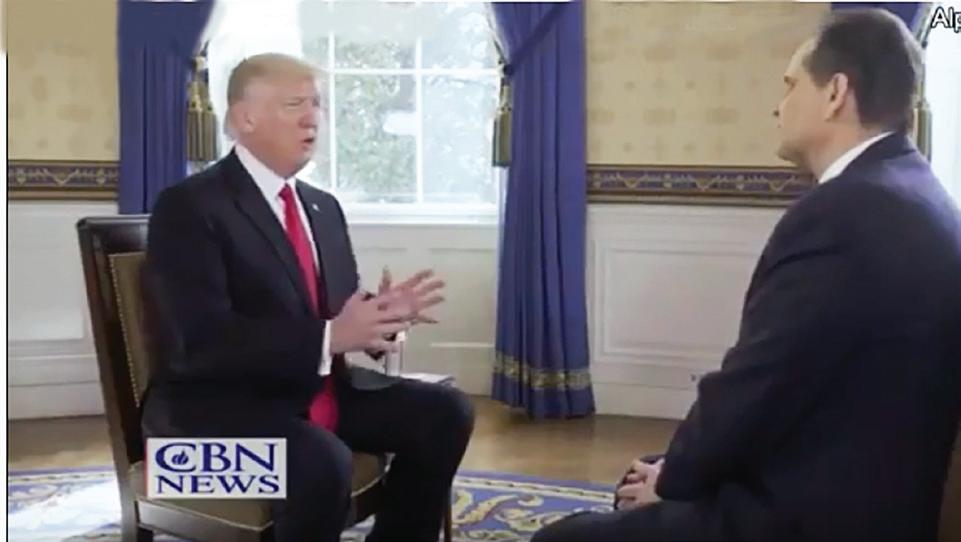
with Christian employers and religious organizations in the Burwell vs. Hobby Lobby and Little Sisters of the Poor Supreme Court cases. Suits were filed because the Affordable Care Act had imposed rules requiring them to violate their religious beliefs and provide abortion-causing contraceptives to employees.
After the announcement, Southern Seminary President Albert Mohler expressed thanks for Trump and support for the nomination: “Judge Gorsuch is committed to textualism and will uphold the Constitution of the United States. His academic credentials are impeccable and his experience as a clerk for two Supreme Court justices and his own distinguished tenure as an appeals court judge qualify him for this nomination without question.”
Russell Moore, president of the SBC’S Ethics and Religious Liberty Commission (ERLC) released a similar statement, calling Gorsuch, “an exceptional choice for Supreme Court justice. He is a brilliant and articulate defender of Constitutional originalism in the mold of the man he will replace: Justice Antonin Scalia.…I heartily support President Trump’s excellent appointment.”
The Gorsuch nomination follows several others of interest to evangelicals. Former SBC president Ronnie Floyd, who attended the National Prayer Breakfast in Washington Feb. 2., pointed out other Trump nominees whom he called “followers of Christ”: Education Secretary nominee Betsy Devos, Sonny Perdue for agriculture secretary, Rick Perry for Energy Department head, Tom Price to head Health and Human Services, Scott Pruitt to lead the Environmental Protection Agency, and Jeff Sessions as Attorney General.
– With info from Pew Research, ChristianityToday.com, and the Washington Post
4 IBSA. org Illinois Baptist
GORSUCH
Inauguration Day – January 20
the first 14 days
Public faith
SBC pastors at inaugural events
The pastor of First Baptist Church of Dallas, Robert Jeffress, stood in the pulpit of an Episcopal church where George Washington worshipped and preached to the incoming president on inauguration morning. He preached about an unexpected leader, Nehemiah, who built a wall around Jerusalem. “You see, God is not against building walls,” he said.
Jeffress recalled sitting with Trump on a jet, eating Wendy’s cheeseburgers, and talking about the nation’s troubles. “…(T)he challenges facing our nation are so great that it will take more than natural ability to meet them. We need God’s supernatural power.”
Jeffress wasn’t the only Southern Baptist prominent in the inaugural events. Four SBC pastors were on the platform at the National Cathedral at the traditional prayer service the day after the inauguration. Former SBC president and Arkansas pastor Ronnie Floyd and California pastor and radio preacher David Jeremiah read Scripture. Texas pastor Jack Graham, also a former SBC president, offered a prayer “for those who serve,” and Texas pastor Ramiro Peña concluded by leading the Lord’s Prayer.
Evangelist Billy Graham was represented by his son, Franklin, as Trump was sworn in, and granddaughter Cissie Graham Lynch at the prayer service.
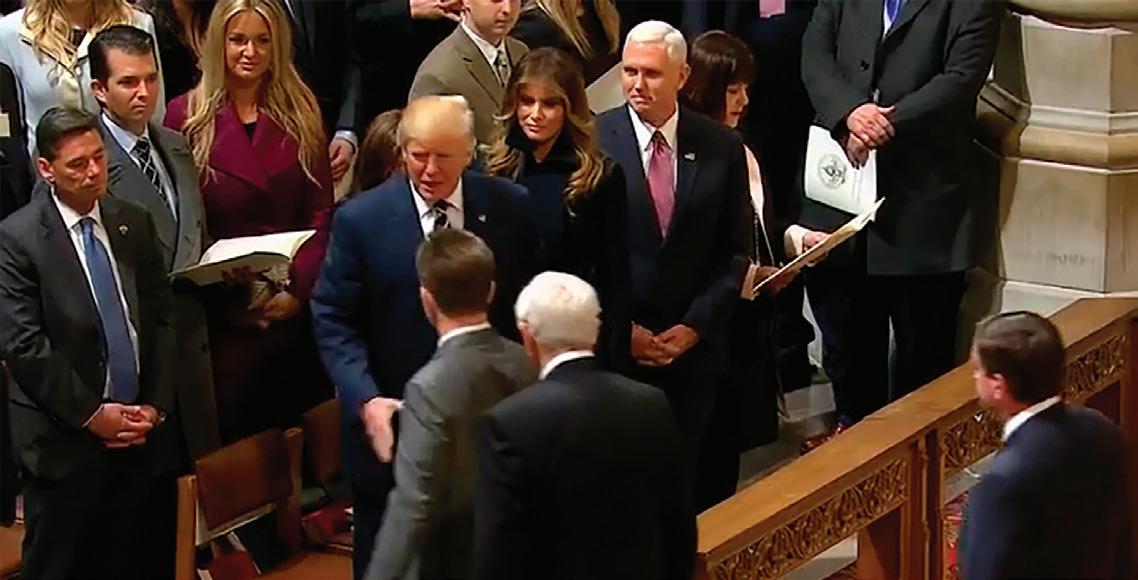
These Baptists were in a phalanx of religious leaders that included Catholics, Episcopalians, and other Protestants, Muslims, Hindus, and Jews. It was reported to be the broadest representation of faith groups ever to participate in a presidential inauguration.
“Right now we’ve got a shot to really make a difference,” Floyd told his church the next day. “God has given us a moment. It’s time to pray more than we’ve ever prayed in our country…to pray more with stronger conviction that every life matters to God.”
Pro-life support

March for Life rally – January 27
Washington, D.C. | Mike Pence became the first U.S. vice president to ever appear at the annual March for Life when he addressed thousands assembled for the event Jan. 27. Pence, a self-described “evangelical Catholic,” told prolife activists assembled in Washington that “life is winning again in America.”
“We have come to an historic moment in the cause for life, and we must meet this moment with respect and compassion for every American,” said Pence, a former governor of Indiana, at a pre-march rally at the Washington Monument. No U.S. president has ever appeared in person at the march in its 44-year history.
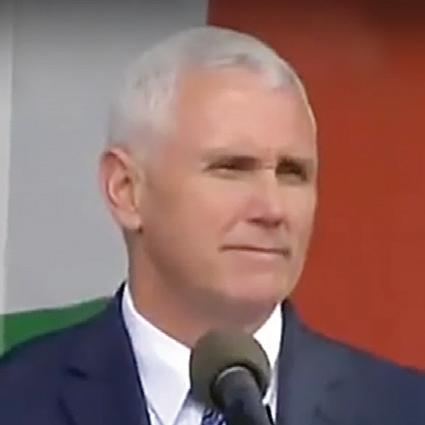
“[A]s it is written, ‘Let your gentleness be evident to all,’” he said, quoting Philippians 4:5. “Let this movement be known for love, not anger. Let this movement be known for compassion, not confrontation….I believe that we will continue to win the hearts and minds of the rising generation if our hearts first break for young mothers and their unborn children, and if we, each of us, do all we can to meet them where they are with generosity, not judgment.”
Pence’s presence at the march was significant to many pro-life leaders because it
Baptists divided over limits on refugees Immigration
Three prominent Southern Baptists took public— and differing—positions on President Trump’s executive order that restricts immigration from seven Muslim countries, suspends entrance of all refugees for 120 days, and prevents all Syrian refugees from entering the United States indefinitely. Commentary from Russell Moore and Ed Stetzer was published in the Washington Post, and Ronnie Floyd spoke out on his blog.
Moore, president of the ERLC, wrote a letter Jan. 30 to the president referencing the Resolution on Refugee Ministry passed by messengers to the 2016 Southern Baptist Convention in St. Louis. “Scripture calls for and expects God’s people to minister to the sojourner. Southern Baptist churches throughout the United States lead the way in carrying out this calling.”
He also expressed concern for the safety of Southern Baptist missionaries who “are among the many Americans living in majority-Muslim countries to carry out the biblical call to love their neighbors.” Moore called on the president to reaffirm his administration’s “commitment to religious freedom” and “adjust the Executive Order as necessary.”
In his Jan. 26 op-ed, Stetzer, the Billy Graham Distinguished Chair at Wheaton College, agreed with the need for a greater focus on national security however, he said, “I’m concerned that the president is operating on generated fear rather than facts. We need a better way.”
Stetzer’s better way is to “reject false facts,” “recapture a vision of what it means that all are made in God’s image,” and to “fight for those without a voice.”
seemed to symbolize the new administration’s commitment to pro-life issues.
President Trump signed an executive order Jan. 23 to reinstate a ban on federal funds for organizations that provide and promote abortions overseas. The next day, the House of Representatives passed a measure that, if approved by the Senate, would enact a permanent, governmentwide ban on federal funding for abortions.
Pence said Trump asked him to speak at the March for Life, The Washington Post reported. He also said the President “stands for the right to life.”
The march coincided with the secondannual Evangelicals for Life conference, cosponsored by the Ethics and Religious Liberty Commission. The conference included an opportunity for attenders to join the March for Life. ERLC President Russell Moore urged more evangelical Christians to participate in the event.
“We should march to show that every life has dignity and also that Jesus offers forgiveness for every sin, freely offered to everyone, no matter what he or she has done.”
– Reporting by Baptist Press
Floyd, pastor of Cross Church, cautioned at RonnieFloyd.com, “If we do not look at it biblically, we enter into dialogue without authority and clarity.” He advised: Love the refugee, fix the immigration system, and pray diligently.
Referencing the 2016 resolution he cited, “…one line in this resolution that realized the biblical responsibility of government: ‘RESOLVED, That we call on the governing authorities to implement the strictest security measures possible in the refugee screening and selection process, guarding against anyone intent on doing harm…’”
Floyd noted, “This line was included in the resolution because as followers of Christ, we must understand the tension that occurs because our government has a responsibility it is mandated to fulfill.”
IBSA. org 5 February 06, 2017
PENCE
JOINING HANDS – President Trump greets pastors Ronnie Floyd and David Jeremiah during the recessional following the prayer service at the National Cathedral Jan. 21.
VP makes historic speech at DC march
How will we treat the messenger?
Russell Moore has the hardest job in the Southern Baptist Convention. He is required to speak on behalf of a people who take great pride in speaking for themselves, even (or especially) with the Almighty. It’s in our theology (priesthood of all believers). It’s in our polity (autonomy of the local congregation). It’s in our DNA (we’re preachers).
So when someone dares to speak for all of us, and says something we might disagree with, we bristle.
Some are bristling over Moore’s anti-Trump stance during the election. And, as the Wall Street Journal and NPR reported a month ago, some churches are considering withdrawing support for the Southern Baptist agency Moore heads, the Ethics and Religious Liberty Commission. Moore apologized for any ill will he caused, but has that settled the conflict?
Moore is two years into his presidency, succeeding Richard Land who served 25 years in the role. Land was brusque, but his views matched the vast majority of Southern Baptists’ on issues of religious liberty and sanctity of life, and we mostly agreed with him when he spoke for us.
But times have changed. As evidenced by Moore, a new generation is rising to SBC leadership, and they focus on different issues than their predecessors did. Moore has spoken to the church’s handling of refugees and the theology of adoption and gender issues—and politics.
Several questions arise from the murmurings about the ERLC:


Is the ERLC really out of touch with mainstream Southern Baptist opinion? Or are we finding, especially in this election cycle, that the world is more complex and even oncemonolithic Southern Baptists have varying opinions on some issues—especially political issues?
Is this a squall that will subside as Moore finds a more modulated approach to his “spokesman-ship”? Or is there really a storm brewing?
Will older leaders assume the statesman role, and let younger leaders lead? Or, is there truly a divide among Southern Baptists among generational, geographical, educational, economic, or political divides that will not be bridged.
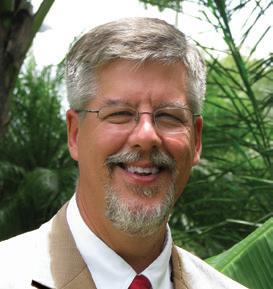
Time will tell, we suppose. But in the meantime— We need the ERLC, and it shouldn’t be muzzled. The ERLC should still represent Southern Baptists in the public discourse on religious liberty, the church, and sanctity of life. True, some ERLC staff posted political opinions on their personal blogs and Twitter feeds during the election cycle. Their views might have been too easily mistaken for Southern Baptists’ as a whole. Only Moore should address the SBC’s core issues in the blogosphere or Twitterverse.
Stop the habitual tweeting. The tweet may be the lingua franca, but the 140-character debate hasn’t served the ERLC well lately. At times in 2016, we wondered if the ERLC really needed to express opinions on so many topics. Those who speak for Southern Baptists should not be reactionary, but instead offer considered opinions and measured words.

Finally, we should acknowledge generational differences and allow the hand-off to proceed. This is no longer the Land era. Younger Baptists may have a different perspective on some things, but, so long as their views are biblical, we must let them speak to their times—and ours.
– Eric Reed
Ph.D.
June 18-22 Grades 3-6
June 26-30 Grades 3-6
June 12-16 Grades
July 10-14 Grades
July 17-21 Grades
What’s True, What’s False, What’s Our Responsibility? Contact Us: 708-781-9328 | www.illinoisfamily.org Forum April 26th Arlington Heights April 27th Orland Park April 28th Peoria Climate Change & the Christian What others say about Dr. Beisner “… an excellent speaker who … held my 200-person Bible class spellbound for an hour!” — Dr. Wayne Grudem, Scottsdale Bible Church “I’ve known two people in my life whose knowledge I would describe as encyclopedic. You’re one of them!” — Dr. R. Fowler White, Dean of Faculty, Knox Theological Seminary “The people loved his lectures, with many … wishing that he could have spoken more.” — Rev. Phil Kayser, Providential History Festival,
NE
Cornwall Alliance for the Stewardship
Omaha,
E. Calvin Beisner,
Founder & National Spokesman, The
of Creation www.cornwallalliance.org
reporter’s notebook 6 IBSA. org Illinois Baptist
WELCOME TO MARS HILL – ERLC President Russell Moore (center) joined a panel discussion on Face the Nation
At Streator Baptist Camp At Lake Sallateeska Baptist Camp
3-6
3-12
3-12
a great week of Bible Study and worship, crafts, paddle boats and canoes, swimming, campfires, archery, fishing and other fun activities. Cost is $160.
www.IBSA.org/Kids.
Enjoy
To register go to
IN FOCUS
Growing leaders
The church’s ministry potential depends on it
While serving as associate pastor of Pawleys Island Baptist Church in South Carolina, Mac Lake said he could feel the church’s ministry efforts crumbling down around him.
“At one point I had 88 people reporting to me,” said Lake, who is now senior director of church planting development for the North American Mission Board’s SEND network. He was this year’s keynote speaker at the Illinois Leadership Summit.
“Of course I was exhausted so I went on vacation and worked on a plan to start developing leaders. The best way to make ministry successful is to make your team successful. Shifting my mindset saved my life, saved my ministry, and probably saved my marriage.”
More than 230 pastors, staff, and leaders from churches across Illinois heard practical strategies as Lake spoke on the importance of leading self, leading others, leading leaders, and leading an organization during the two-day event held January 24-25.
“This opened my eyes to the difference being intentional in your leadership strategy will make,” said Garry Hostetler, pastor of First Baptist Church Bogota in Newton. “I enjoyed getting together with other pastors and leaders and getting real help that I can put into practice right away.”
“When we’re spiritually disciplined we’re often more vocationally effective,” Sarah Bond urged those attending one of 28 breakout sessions. The professor at SIU-Carbondale challenged church leaders to “become the change-maker God intends you to be.”
She—and the other trainers and equippers— found a ready audience.
“When I was pastoring it was alarming to discover that my leadership was one of the obstacles to the growth of the church,” said Mark Emerson, IBSA’s associate executive director of the Church Resources Team. Emerson’s pastoral experience helped him in planning the Summit. “In my ministry, I discovered if we were going to

Team Coverage: Illinois Leadership Summit
Expert Mac Lake on the real genius behind effective leaders
Pastors and practitioners on guarding your heart
Advice on raising up the next generation
P. 8
IBSA. org 7 February 06, 2017
Continued from page 7
grow a congregation, I had to grow as a leader. It is important for leaders to realize their leadership lid and to grow past it.”
For attenders at the Summit, much of the experience was about discoveries about themselves.
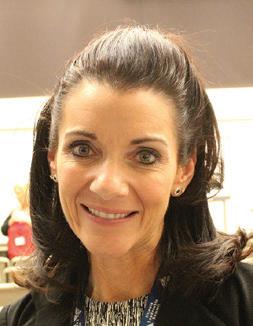
“When we do this kind of leadership development, pastors begin to get excited about their own growth and the growth of leaders in their church,” Emerson said. “I believe every pastor believes leadership development is important, yet it tends to get lost amid the plethora of other ministry tasks.”
Doers vs. developers
Lake opened the conference with a story about the small town where he grew up, and the small church where he grew as a leader. Handley, West Virginia, peaked at 633 residents in 1980.
“I don’t think we ever broke 70 (attenders) at Handley Baptist Church,” he said, calling his home church not small, but “normative.” It was the same size as most Southern Baptist churches. Yet, it was in this environment that Lake discovered he could be a leader. “That church taught me how to love like Jesus and how to live like Jesus….The opportunity the normative-size church gave me to serve like Jesus and develop my leadership skills started there as a kid.”
Lake said leadership development is vital for all disciples of Christ no matter where they are in their Christian walk. He shared the story of his three “conversions” in his personal growth. Lake said:
(1) He went from “lost to found” when he was saved at 9 years old at that small church in West Virginia, then
(2) he went from “being a ministry doer to a ministry leader” when he was in seminary at 27, and finally
(3) a few years later as an associate pastor, he went from “leader to developer of leaders.”
“One of the biggest challenges for leaders who move to this level of leadership is continuing to act like a leader rather than a leader of leaders,” Lake said, offering a comparison between disciples and disciple-leaders. At first glance, discipleship training and leadership development might seem similar. While they go hand in hand, there are important distinctions. For example:
• Discipleship focuses on intimacy with God while leadership development focuses on influence with others.
• Discipleship is learning to live like Jesus while leadership development is learning to lead like Jesus.
• In discipleship, a person is learning to lead himself, while leadership development teaches how to lead others.
• Finally, discipleship works on the character of the person while leadership development works on his or her competency.
“While some people make the jump from disciple to leader in our churches, many aren’t prepared to do it,” Lake said. “Nobody taught them before they
What
got thrown in. So you have all these people in the swimming pool of leadership and they are splashing and hollering—nearly drowning—because they don’t know how to swim. Their leadership, the church’s ministries, and even their personal relationship with God will grow to a whole new level once they are developing as leaders.”
Without a consistent and intentional leadership development plan, many of the great “doers” of the church or ministry will struggle in leadership positions. “It’s like asking a lost person to reach someone for the Lord,” Lake said. “They’ve never had that conversion so they don’t have the knowledge and realization they need.”
Leaders often find themselves focusing more on the work than on the workers, and that has a limiting effect on the growth of ministry. “One of your primary responsibilities as a leader is stewarding the gifts and strengths of those in your charge,” Lake advised. Most churches structure for ministry function, rather than for leader development, he warned.
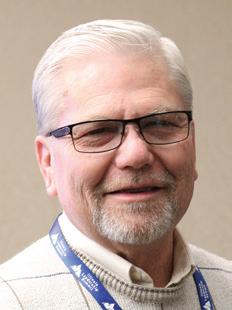
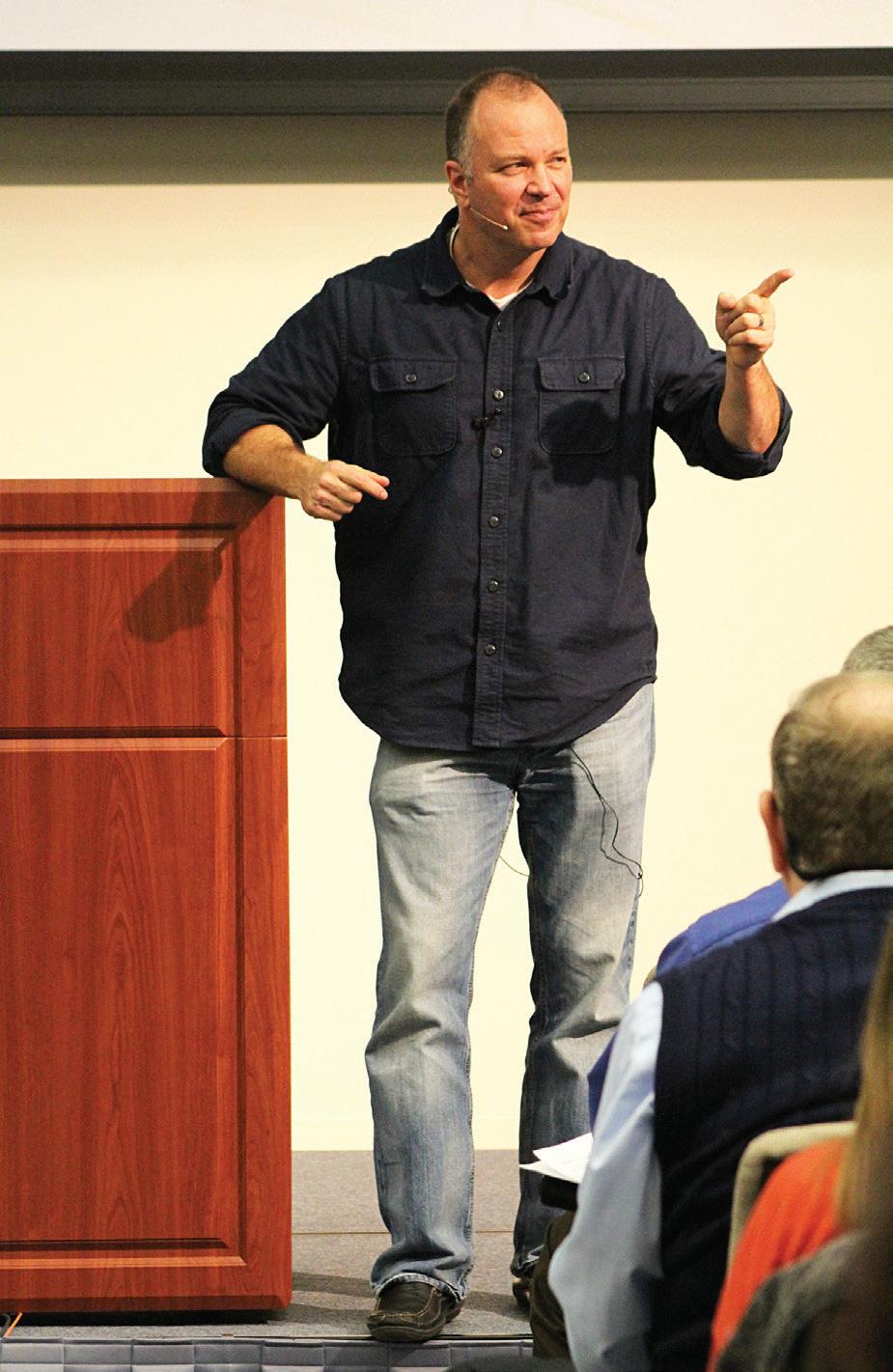
A glimpse of the future
Developing the next generation of leaders presents many challenges in this culture of never-ending distractions and instant gratification, but Lake is optimistic about the future of the church.
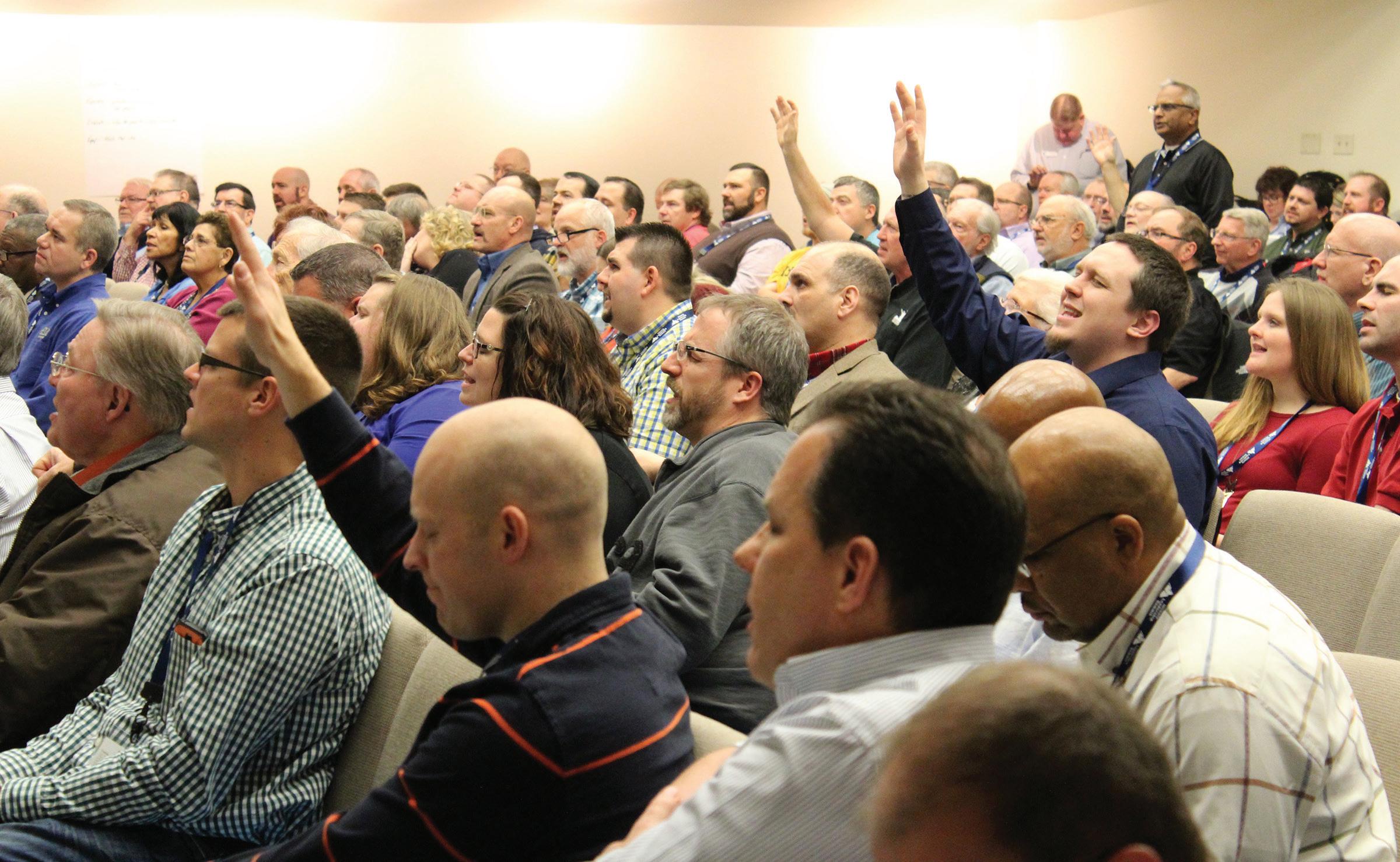
“Millennials in general place an extremely high value on relationships and authentic faith-sharing,” he said. “A pastor willing to mentor this group must be vulnerable. They need to see we’re all co-learners because, in reality, we are. A 50-yearold pastor is no longer in the world he knew. He’s living in their world.”
Continued on page 10
I’ve begun to see how I need to develop leaders in our church. In a small rural church, sometimes it’s difficult. You don’t have a whole lot of people to choose from, so I need to be able to begin to develop the people who are there. Just take two or three key people, use them, develop them as leaders, so that they can in turn invest themselves in others.
– Jerry Darden, pastor,
The Summit reinforced that I’m surrounded by a family of believers, which is also a wonderful network…. I need to reach out and engage more with my brothers and sisters in the faith, to help encourage me, and to help encourage them as well.
– Sarah Bond, First Baptist Church, Marion
New Life Baptist Church, Waverly
8 IBSA. org Illinois Baptist
will you take away from the Summit?
ON POINT – Expert Mac Lake tells church leaders, “don’t let your insecurities dampen your future leadership influence.”
Illinois Leadership Summit
Cultivate spiritual health
Times of ministry burnout are coming, Heath Tibbetts told leaders gathered in Springfield for the Illinois Leadership Summit. So are areas of weakness. But there is a way to prepare for those inevitable difficulties, said the pastor of First Baptist Church in Machesney Park.
“Spiritual build-up prepares us for burnout and blind spots that we know are on the horizon,” Tibbetts said during his breakout session on the spiritual health of a leader.
One warning sign that spiritual build-up may be lacking, Tibbetts said, is reacting poorly to challenges. There was a time, he said, when his church didn’t plan for occasional obstacles, like losing a Sunday school teacher or facing a bill they couldn’t afford to pay. Leaders can fail to prepare in the same way, if they allow their current plans and level of knowledge to be enough.


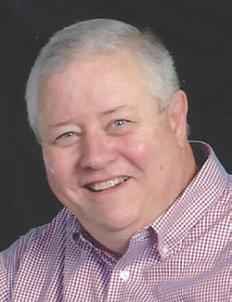
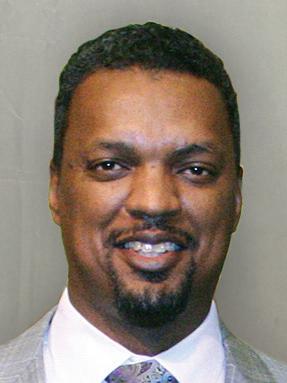
So, how can a leader make sure his or her spiritual health is strong? Tibbetts suggested several ideas, including coaching from other leaders. He recently starting a mentoring relationship with a pastor in another part of the country, which started when Tibbetts read a magazine article about how the other church was utilizing facility space and e-mailed the pastor a question.
There’s also a need for trusted friends who can ask questions like, “How’s your relationship with your wife?” Tibbetts added.
Building oneself up spiritually also comes from time with God himself, he reminded his audience. “Personal devotion is one of the easiest things to let slip in your life.” As a pastor, if sermon preparation is the only study he does, Tibbetts said, and if he isn’t spending devotion time in other parts of Scripture, not only will the sermon be lacking, but he’ll also be missing a valuable build-up opportunity.
When ministry burnout does come, Tibbetts said, there are ways to confront it. Unplug, and “say no a lot.” Leaders need to remember their vision for ministry, even apart from what they are currently doing. “Visionless ministry punches the clock,” Tibbetts said, asking leaders to identify, What defines you separately from your ministry?
And keep building up. Tibbetts said a man in his church recently waited two months to call him for a counseling appointment, because he knew his pastor would ask about his spiritual life, and he wanted to make sure he was reading his Bible. If you’re confronting burnout, Tibbetts said, schedule more times of prayer. – MDF
Heard in the breakouts…
Inside every pastor, there’s a micromanager waiting to burst out. You’ve got to keep fighting back that flesh, and let the members do the work of ministry.
– Adron Robinson, pastor, Hillcrest Baptist Church, Country Club Hills
Follow the follower
Christian leadership training experts like to cite Jesus as an example of the best leader ever, Michael Kramer told Illinois Leadership Summit breakout attenders. While he agrees, the pastor also believes Jesus is an example of the best follower the world will ever see.
The education pastor from Immanuel Baptist in Benton based his claim on this: “Christ called us to be followers. Even Jesus followed the will of the Father. Jesus was the greatest follower and his disciples followed him… As followers we are to be deeply dependent on Jesus.”
As leaders, Kramer stressed, we are to follow the tenet of John 3:30—He must increase, I must decrease. “Our intake of Jesus must be greater than our outtake,” he said. “We need to be spending much time in the Word. Not time in sermon preparation, don’t count that.”
Kramer suggested several ways to increase private prayer time and Bible read-
Leverage
ing. “Read through the Bible in a year or read a Psalm a night. Download a Bible app and listen. Buy the Jesus Storybook Bible, it’s the most creative Bible I’ve come in contact with. It goes straight to the heart. Memorize a Bible verse a week.”
“Pray the Lord’s Prayer every morning before your feet hit the floor,” Kramer said. “Go away for a few hours or an even longer period of time once a month just for prayer.” Kramer will spend a few hours in the woods walking and talking with God. He also recommended praying through a prayer list with your spouse, children, or grandchildren
By increasing time spent with God, you begin to decrease your focus on self. “What’s it look like to decrease?” he asked. “When God wants to go after your heart he’s going to do it in an unexpected way. Christ is going to go after the places that he wants to claim in our hearts.”
others’ strengths
Because she was only 13 months younger than her brother in their small high school, there were many classes Carmen Halsey attended with him.
“I took the book home to study and he never did, yet he’s the one that always pulled the A,” said Halsey during a breakout session at the Summit. “We live in a culture that tells you practice makes perfect, well I’m here to tell you that’s a lie. That mentality is setting people up to fail. Sometimes we are just not a natural, and all the practice just depletes our energy level and leaves us feeling incompetent.”
Halsey, who serves as IBSA’s director of women’s ministry and missions, as well as Illinois WMU executive director, spoke on how to leverage the strengths of leaders.
First, Halsey said, leaders should have a general knowledge of how God created the
brain and understand how their emotions impact them.
“All people experience things emotionally before their reason kicks in, but not all people do this at the same level,” she said. “Understanding the differences of how this works within a team will increase performance and decrease time wasted and drama.”
Halsey said the next step is identifying a person’s natural talents and strengths. “Take inventory. Ask them to take a strengths survey, to describe their dream job, and the sweet spot of their current ministry,” she said. “Watch them. People will naturally nurture their strengths without much thought behind it.”
Once strengths are identified, the leader must be intentional to invest in further developing those strengths.
“We must find ways to cultivate the natural talents in people to make them
Continued on page 10
If Nehemiah had tried to do the work [of rebuilding Jerusalem’s walls] himself, it would have taken him 25 years. Because he was willing to delegate, it took 52 days.
– Tracy Jaggers, director of missions, Gateway Association

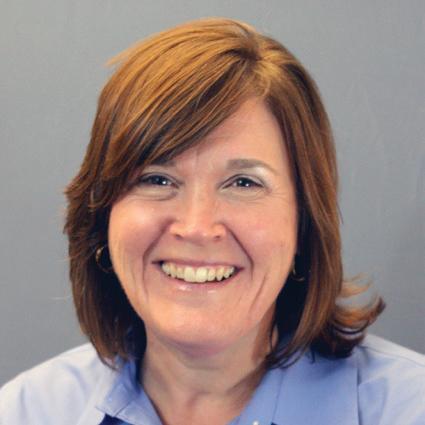

Don’t be satisfied. Don’t be that guy who was pretty good and never got any better. You let God do all the work he needs to do in your life.
– Doug Munton, pastor, First Baptist Church, O’Fallon
IBSA. org 9 February 06, 2017
TIBBETTS
HALSEY
– LMS
KRAMER
Lake: continued from page 8
He said all leaders must understand the dangers of social media and the challenge to stay focused and turn off distractions. At the same time, leaders must see how social networking can be beneficial for the work of God and utilize its potential for kingdom growth. “With technology and all that it entails, mentors have to embrace this world and ask for help navigating this new culture to stay relevant,” Lake said.
Though Lake has taught leadership to pastors and church planters across the country, this was one of the few statewide conferences he’s been invited to where the main purpose was to teach leaders how to lead with excellence.

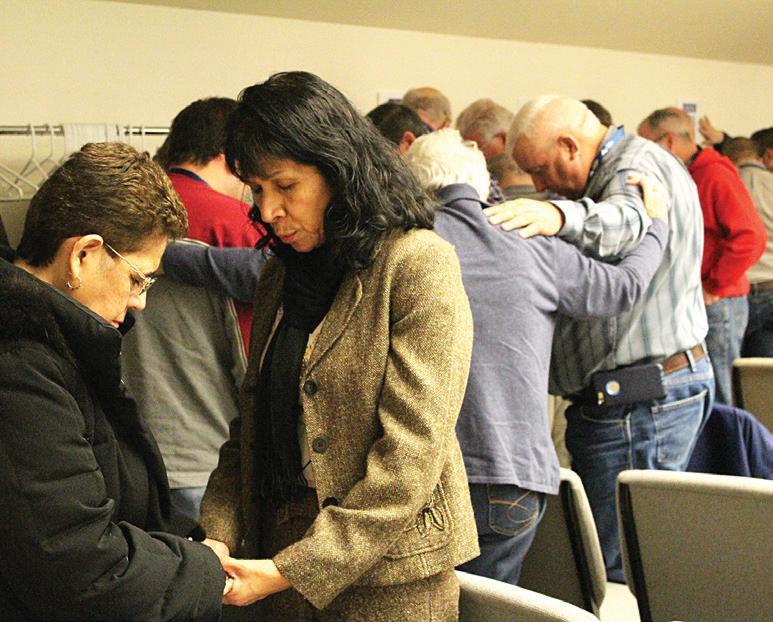

“Illinois Baptists see the need to build a culture of leadership development,” Lake said. “Too many visions die because the leader never trained others to do what he did. The Great Commission is a vision big enough for others to give their lives to. We have to think in terms of ‘generations.’”

We used to tell leaders to “replace themselves” by training others to come after you. “Don’t replace yourself, reproduce yourself” with leaders to work alongside you, he concluded.
Lake said he prays that together leaders will create the culture in their churches that will produce the best harvest. “I applaud the Illinois Baptists for feeding their pastors and helping with the challenge of leadership issues,” he said. “This is important and these are things you don’t necessarily learn in seminary.”
Halsey: continued from page 9
even stronger,” Halsey said. “We do this in practical ways with our encouragement, and by providing training opportunities. As we come alongside our team, we are confirming their strengths.”
Finally, Halsey said, a church or organization should always position people according to their strengths. “Sometimes out of need we ask someone to sit in a seat that might not be their best position,” she said. “If that’s the case, communicate that it’s temporary. And move them to a better fit as soon as you can. That’s how a person can get from good to great.”
YOUR DOOR TO OPPORTUNITY SHAPE YOUR LIFE TO SHAPE THE WORLD
DOOR YOU OPEN TODAY DETERMINES THE
FOR
TOMORROW.
the
to
ILLINOIS’ ONLY BAPTIST UNIVERSITY • ELGIN, IL Traditional Program 847.628.2510 JudsonU.edu Adult Program 847.628.1500 JudsonDegree.com TAKE THE NEXT STEP. VISIT US ON PREVIEW DAYS February 19-20, 2017 (Overnight) March 31, 2017 IBSA February 2017 – Preview Day.indd 1 1/27/17 12:03 PM 10 IBSA. org Illinois Baptist
– KR
THE
DOORS THAT WILL OPEN
YOU
We understand the importance of providing you with opportunities — for knowledge, experiences, spiritual growth, and preparation in your chosen field of study. Opportunity is knocking. Open
door
Judson.
– Reported by Kayla Rinker, Lisa Sergent, Meredith Flynn, and Eric Reed
SMALL GROUPS WORK – Summit attenders shared times of prayer and discussion.
MISSION
‘We want people to pray’
Prayer and missions are good partners in Peoria
BY KAREN L. WILLOUGHBY
Peoria | Pastor Joel Newton anticipates Woodland Baptist Church will grow closer to God with the congregation’s new emphasis on prayer, adding to commitments to missions giving and going.
During the Jan. 22 Sunday morning worship, the church embarked on its new “Choose 2 Prayer Partner Project.”
“Everything begins with prayer,” Newton told Baptist Press. “Prayer was a priority for the New Testament church.”
Newton led his staff and other church leaders to build a prayer emphasis around teams of two people praying together each week, interceding for a specific nation and four specific people who are spiritually lost.
“A vital part of our discipleship is the practice of prayer,” Newton said. “Prayer helps us become more like Christ.” The prayer ministry is adapted from an outreach begun in 2012 by Tim Sadler, then evangelism director for IBSA. When coupled with missions giving and going, the renewed prayer emphasis will hopefully result in Woodland Baptist having an increased impact for God’s Kingdom, Newton said.
Generous giving is an aspect of discipleship Newton believes Woodland members already do well. The church allocates more than 20% of its undesignated income to missions, including 16% through the Cooperative Program.
“Cooperative Program giving has been a priority for Woodland for many years. Missions is in the
P. 12
Editor’s note:
Baptist Press regularly profiles SBC churches with strong commitment to missions giving. This month, BP selected an IBSA congregation in Peoria.
PARTY TIME – Woodland Baptist Church in Peoria (above) hosts three block parties each summer at a neighborhood park to build relationships with its multiethnic neighbors.

IBSA. org 11 February 06, 2017
Continued from page 11
DNA of this church,” Newton said. “For us, giving is important because it helps us minister beyond the walls of the church.
“Giving to the Cooperative Program helps us recognize we need to be a part of what God is doing around the world,” he said. “The Cooperative Program helps us see beyond where we are locally, and to see the importance of sending people even for short-term missions.”

The church’s local ministries include partnership with the Midwest Food Bank, allowing the church to give monthly packs of food to about 30 families. Woodland Baptist hosted three block parties in a nearby park last summer, and is planning another three this summer to reach families living in apartments just across the street from the church.
“A large Asian Indian population is one of the groups we’ve been trying to minister to,” Newton said. “The block parties have led to the building of some relationships” enriched by English as a Second Language (ESL) classes and cooking classes showcasing cultural dishes. The church’s four-daysa-week preschool, started in the early 1970s, has an enrollment this semester of 64 neighborhood children of various ethnicities.
“Peoria is an international city,” Newton said. “We’ve been doing English as a Second Language classes for at least 20 years. Harold and Jean Stark lead the ministry. Harold has written most of his own material, which he calls ‘Idioms.’ He includes phrases common to Americans but confusing to people from another culture, such as ‘raining cats and dogs.’”
An additional outward focus is the Congolese congregation that has begun meeting at the church as an outgrowth of its ESL ministry. One of the neighborhood contacts is a pastor from the Congo who was already hosting weekly worship in his apartment, although his wife and two daughters are still in the Congo. After talking with Joe Gardner, Metro Peoria Baptist Association director of missions and IBSA zone consultant, and John Mattingly, director of Northwest Region Church Planting for IBSA, Woodland Baptist extended use of its building to the Congolese house church.
“They’re still just trying to find their way, trying to earn enough money to have a place to live, and learning the language,” Newton said. “Woodland is just excited to be a part of what God is up to. We’ve tried to see ‘where God is working and join him there,’ as Henry Blackaby has said, and it’s such a blessing to be used by Him.”
Woodland Baptist has also shared its building with groups of Chinese and Korean worshippers. The Congolese outreach extends to people more than 100 miles from Peoria, and has the potential to birth other Congolese churches.
Founded in 1943, Woodland has helped start three other churches: Oakwood Avenue Baptist Church in East Peoria, First Baptist Church in nearby Morton, and Agape Missionary Baptist Church, an African-American congregation.
The Choose 2 prayer emphasis was a God-


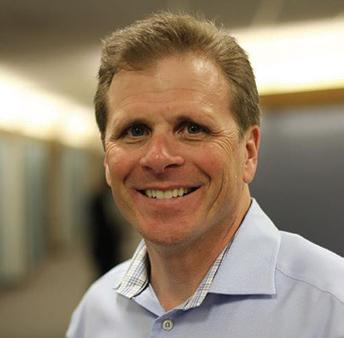
inspired extension of the church’s strong missions focus, Newton believes. “God’s Spirit was working in this to give us direction,” he said.
After much discussion, leaders determined to “trust God’s Spirit” to lead the prayer ministry, Newton explained. Men were paired with men, and women with women in forming prayer partners. The partners were announced during the Jan. 22 worship service. They were instructed to give each other the names of two people who do not have a personal relationship with Jesus, to pray for all four by name every week, and to pray for a nation assigned to the team.
“We’re emphasizing the importance of prayer,” Newton said. “The praying causes us to think of lost people and perhaps to reach out to them directly, and…to think of what God is doing in the world.”
Karen Willoughby is a national correspondent for Baptist Press. IBSA Communications Director Lisa Sergent contributed to this report.


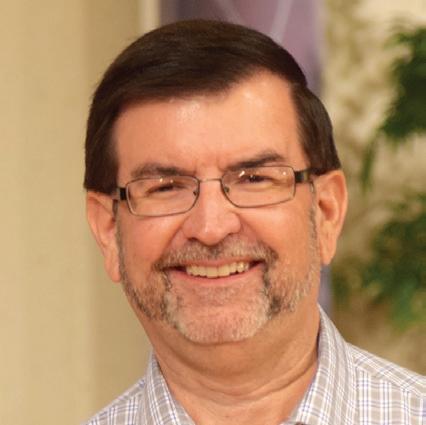

12 IBSA. org Illinois Baptist
Saturday, February 18, 2017 10:00 AM - 3:30 PM Village Church of Barrington | 1600 E. Main St., Barrington, IL Dr. Turek is a dynamic speaker, award-winning author and the president of CrossExamined.org. His books include Stealing from God: Why Atheists Need God to make their Case; I Don’t Have Enough Faith to be an Atheist; Correct, Not Politically Correct; and Legislating Morality. He presents powerful and entertaining evidence for Christianity and has debated prominent atheists including Christopher Hitchens and David Silverman, president of American Atheists. Worldview Conference Biblical Training for Today’s Culture Third Annual Contact Us: 708-781-9328 | www.illinoisfamily.org Politics How to respond to “Gender Confusion” Does Absolute Truth Exist? Atheism’ Burden of Proof Apologetics Religious LIBERTY LGBTQ Contradictions Politically Incorrect $20 per person/$50 per family/Student Scholarships Available Featuring Dr. Frank Turek NEWTON Church Technology Conference February 18 • IBSA Building, Springfield 9 a.m. - 2 p.m. • Cost is $10 (includes lunch) To register visit www.IBSA.org/worship, call (217) 391-3132, or e-mail SteveHamrick@IBSA.org Watch or download CP promotional videos at talkcp.com/resources.
Members of Woodland Baptist Church in Peoria, Ill., meet with children in Senegal, West Africa. Submitted photo
Why we plant churches

“I can worship God riding my horse alone in the woods just as well as I can sitting in a room full of people at church,” insisted a deacon at a long established church in a small southern town.
His statement revealed an individualistic view of the Christian faith that is all too common among Southern Baptists.
His pastor replied that while worship can and should happen while riding a horse through the woods, the local church is the only biblically defined, God-ordained, Jesus-headed, and Holy Spiritorganized place for spiritual growth and maturity to happen.
In responding to this man, the pastor also revealed one biblical basis for church planting. In Hebrews 10, the writer calls for the Hebrew Christians to not forsake corporate gathering in light of the value and necessity we have to each other. One key part of that value, the writer tells us, is encouraging or urging one another on to love and good deeds (10:24).
Without the benefit of Christian community, the writer goes on to note, our human tendency is to wander farther from the expressions of the new nature we receive in Christ.
Many have written, preached, and taught about the greater evangelistic fruitfulness common among church plants. Alone, that would be sufficient reason to plant more churches. Yet, the writer of Hebrews reveals that local churches are essential to fulfilling the fundamental mission of believers. That mission is the making of mature followers of Jesus: disciples (Matthew 28:19-20; Colossians 1:28).
In Illinois, we face the enormous challenge of seeing believers mature in Christ-likeness. The mission field that is our state is not just large geographically, it is also inhabited by a wide variety of people. People from all over the world call our state home.
Additionally, every ethnic group in Illinois has generational distinctions among them that are reflected in differing world views, communication styles, and values. While that may be obvi-
ous in Chicago, it’s just as true in Hooppole and countless unincorporated rural regions of our state. Church planting offers us the opportunity to reach the people of Illinois with the gospel. Church planting offers us the opportunity to see a wide variety of peoples won to Christ, but also to grow in Christ-likeness and to mature as disciples in community, as God has designed.
In suburban West Chicago, we have a church plant that is evangelizing and discipling Zomi people who have come to the U.S. as refugees. Having come to these shores from Burma as a result of religious and ethnic persecution, Zomis are hearing and responding to the gospel through the work of a Zomi church planter, Kam Sen.
Kam Sen understands the values, needs, and concerns of his Zomi kinsmen because their experience is his experience. He understands how to communicate biblical truth in ways that connect
with them. And he knows how to lead them to maturity as disciples.
In southern Illinois, there are young and middle-aged adults who may not value all the expectations of attire and conduct that may be part of the culture of established churches in their area. They may not know all the theological vocabulary that is sometimes common in churches with a long history. The long, deep, and beneficial relationships among people in older churches can be impenetrable circles to unchurched people.
Planting new churches allows older, established churches to continue fruitful, effective ministries of evangelism and discipleship, while allowing new churches to engage, evangelize, and disciple people who feel excluded by the cultural distinctions of the established church.
Throughout Illinois, we have people groups who do not have ready access to the gospel. They do not have a group of believers with whom they have enough in common to develop relationships of trust and understanding that are essential to hearing the gospel and responding in faith. They do not have a community of believers with enough in common to urge one another on to love and good deeds.
Church planting holds for us the greatest opportunity to see the various peoples in Illinois have the opportunity to hear and respond to the gospel, and to grow as followers of Jesus along with other disciples.
Dennis Conner directs IBSA’s church planting efforts in northeast Illinois.
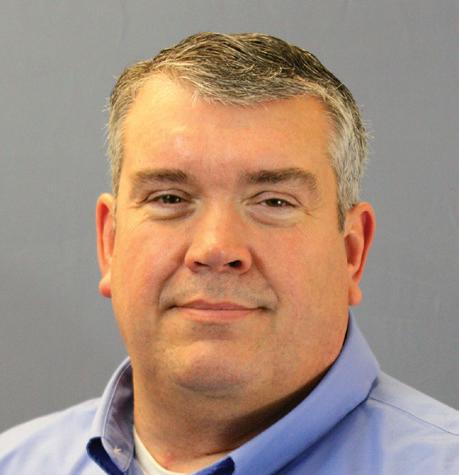
Mission field next door
Playing in her yard, little Paula loved hearing the music at the church next door. She often peeked through the fence to watch happy people going inside. One day, a woman noticed her behind the fence and asked, “Do you want to go to church with us?”
It was the happiest day of her childhood! Paula’s entire family came to know Jesus as Savior because of that invitation. (I’m so glad, because years later she became my friend.) Is it possible for someone to live within walking distance of your church, but not be influenced for Christ?
Here’s a challenge for your small group or church. Choose a block of homes or apartments nearby, then make a plan to know and invite each person who lives there. Here’s how: Chart the block. Blitz your block one Sunday. Deliver a Bible or plant to each home. Meet them. Learn names. Be a friend. Pray for them. See needs, meet needs. Mow an overgrown lot. Paint a decaying home. Build a ramp for an elderly neighbor. Show God’s love tangibly.
Personally invite neighbors. Welcome them inside your church for worship, Wednesday dinner, Easter celebration, kids event, or Bible study. Meet them there.
Remind neighbors they are welcome. Use outdoor banners, signs, or sidewalk chalk art. Consider their needs. Plan an exercise group, benevolence, community garden, GED; a class or event for young professionals, parents, immigrants, singles, kids, married couples. Invite them.
Share the facilities. Share your church gym, playground, library, basketball goals, or walking track. Host a coffee. Personally deliver invitations, serve snacks, provide nametags, and get to know guests.
Participate. If there’s a neighborhood event, go. If there’s a neighborhood newsletter, advertise in it. If there’s a neighborhood crisis, be the first to serve. Show God’s love.
Last Sunday, Suzie was telling our small group about the senior care center being constructed next to our church property. “Some folks there won’t know Jesus,” she exclaimed. “We’ve got to do something!” There is our mission field.
“His sermon on self-denial would have been more compelling had he placed more emphasis on what’s in it for me.”
Diana Davis’ new book is Across the Street and Around the World (New Hope Publishers, 2016). dianadavis.org

IBSA. org 13 February 06, 2017
DIANA DAVIS
table talk
In Illinois, we face the enormous challenge of seeing believers mature in Christ-likeness.
fresh ideas
Tower gives intercessors a ‘God’s-eye view’
Prayer meeting attenders urged to see the city how he sees it
Chicago | Fifty church leaders gathered 99 stories up on Saturday, January 28, to pray over—the thirdlargest city in the U.S.
From atop the Willis Tower (better known as the Sears Tower), pastors and others mostly from the Chicago Metro Baptist Association got a “God’s-eye view” and captured a glimpse of his heart for the city, said participant Phil Miglioratti.

“I think God uses a setting like this to put the burdens of his heart into our hearts, and that’s really what prayer is meant to be,” said Miglioratti, IBSA’s prayer ministries coordinator. “You don’t have to be 99 stories up to get that, but places make a difference.”
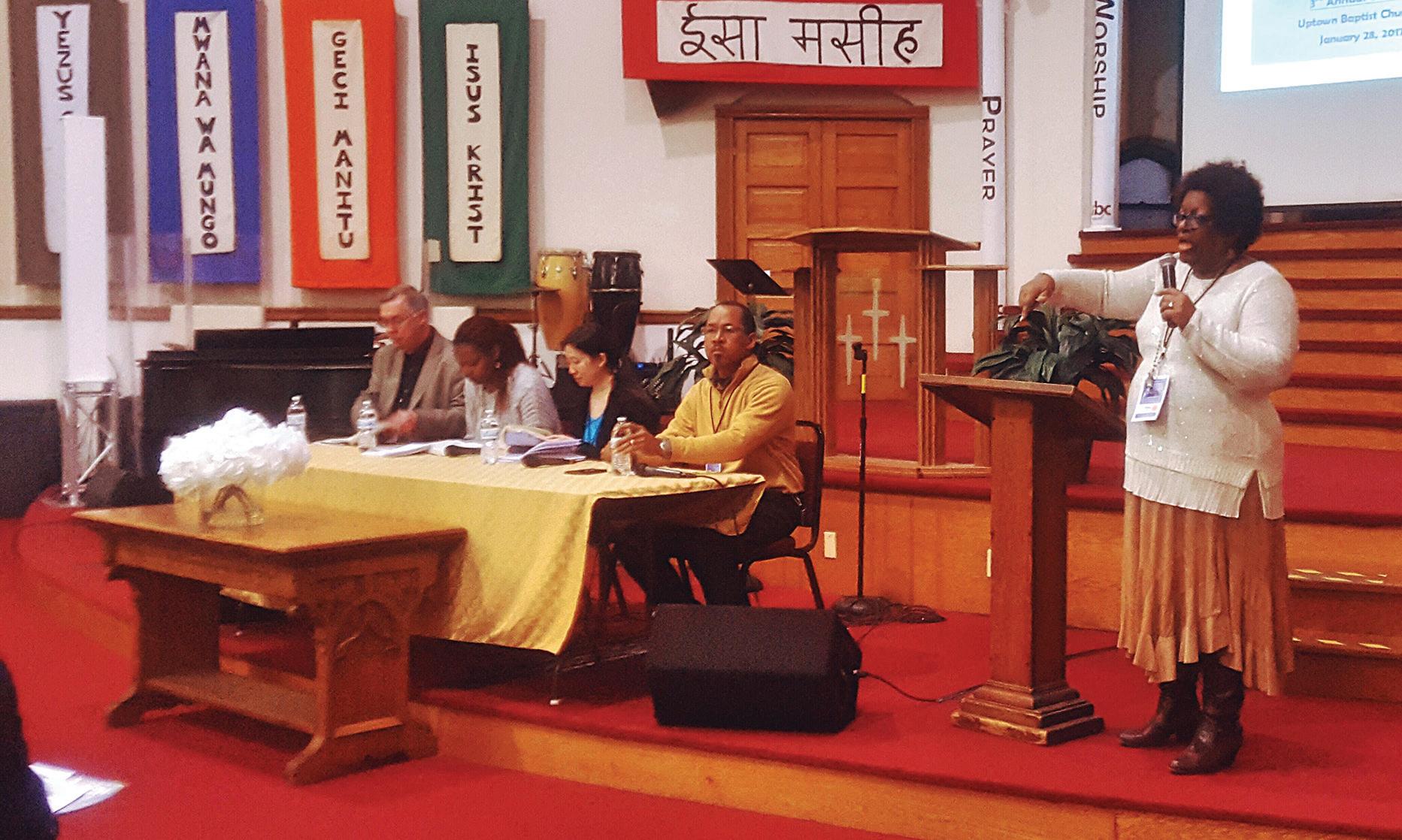
The rooftop gathering was organized by Chicago Metro’s prayer coordinator Cheryl Dorsey as part of the Chicago Association’s annual prayer conference. The day started at Uptown Baptist Church with workshops on prayer and spiritual warfare. Then the group headed downtown for the prayer meeting led by John Whaley of The Rooftop U.S., a ministry that helps churches engage with God’s mission through prayer.
Meeting in the tower, Dorsey said, “was like being in church.” Reflecting on the event, one pastor wrote her to thank her for the “precious God moment” he experienced.
“Because it didn’t feel like we were in an office tower,” Dorsey said. “It really felt like we were in his presence.” Even tower staff felt it. Dorsey saw a security guard and an event coordinator who were stationed near the group hush another staff member when she got off the elevator. “They had caught on,” she said.
Looking out over the South Side of the city, Dorsey said she was reminded of the art of the Chicago skyline and dramatic clouds that she had chosen to promote the conference. “I began to weep because the clouds reminded me a of a heaviness coming over the city.” From the rooftop perspective, she said, “The Lord just had me praying
NeTworkiNg
Find more information on ministry positions at IBSA.org/connect
Send NetworkiNg items to IllinoisBaptist@IBSA.org
people
Welcome
Scott Foshie will join the IBSA staff Feb. 15 as a parttime zone consultant in Zone 9, which includes Franklin, Goshen Trail, Greater Wabash, Nine Mile, and Salem South Associations. Foshie will continue to serve as pastor of First Baptist Church in Steeleville, where he recently celebrated his two-year ministry anniversary. He and his wife, Audra, have three children: Lydia, Levi, and Liz.
Mark Goldman is the new senior pastor of First Baptist Church in Herrin. He previously served as pastor of First Baptist in Carlyle, a post he has held since 2005. Goldman and his wife, Valerie, have four children: Isaac, Titus, Charis, and Aleia.

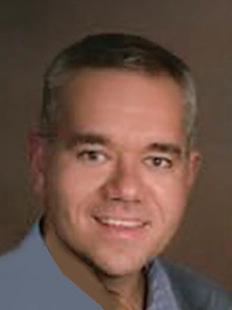
Anniversary
First Baptist Church, O’Fallon, celebrated their 150th anniversary Jan. 29. IBSA Executive Director Nate Adams presented a plaque to the church and Pastor Doug Munton (right), who later blogged about seven lessons the church has learned in their 150 years. Number 7: “Remembering the past can help us dream about the future,” Munton wrote. “I’m asking God for faith like my forefathers. I’m asking him to help us dream big dreams and plan big plans and do great things for his glory just like they did.”

for darkness to be lifted.”
Through their prayer time, many people at the meeting felt challenged to see the people of the city like God sees them, Dorsey said.
Doug Morrow, executive director of the Baptist Foundation of Illinois and a Rooftop board member, agreed. “We have an opportunity, but it will take surrender, it will take recognition to see with God’s eyes, and it will take, at the end of the day, a heart that emulates the compassion of God, where we’re far
more interested in what he cares for, what his heart breaks for, than we are our own issues and our own agendas.”
But the prayer can’t end on the rooftop.
“Mountaintop experiences are only great if they’re translated into the marketplace,” Morrow said. “This kind of perspective is only helpful if it helps you also see across your street.”
Charity Baptist Church, located about six miles outside Carlinville, seeks a pastor, either full-time or bivocational, who agrees with The Baptist Faith & Message (2000) Parsonage is available. Send resumés to Search Committee, 21694 Charity Church Road, Carlinville, IL 62626. Contact Bill Harding at (217) 854-6071.
Taylorville Southern Baptist Church seeks a bivocational pastor with strong leadership skills to reach the lost in and around our community, and a dynamic personality with a strong godly desire to guide and direct the congregation. E-mail tonitreuthart@yahoo.com or send resumés to 212 W. Vine, Taylorville, IL 62568. Contact the Pastor Search Committee at (217) 237-2272.
Baptist Children’s Home and Family Services seeks a couple without children to serve as relief houseparents in Carmi. The couple will work four days per week between two boys’ cottages, providing relief for the primary houseparent couples. An apartment is available for days off. This is a full-time job with benefits. Contact melinda.bratcher@bchfs. com, and go to bchfs.com for more information about the agency.
14 IBSA. org Illinois Baptist
– Photos and reporting by Joseph Dorsey
CHICAGO PRAYER – On an overcast day in January, Pastor Michael Allen (above) and dozens of other church leaders prayed over their city from Willis Tower. Earlier that day, Allen’s church, Uptown Baptist, hosted the annual Chicago Metro Baptist Association prayer conference coordinated by Cheryl Dorsey (right in photo below).
EVENTS
February 6, 7

Tax Seminars
What: Tax info for current and retired ministers, treasurers, and other leaders
Where: Feb. 6: Gateway Association, 7-9 p.m.; Feb. 7: IBSA Building, 8:3011:30 a.m. and Immanuel, Lemont, 7-9 p.m.
Register: IBSA.org/church_health
February 11, 18, 25
Battle Ready Men’s Conferences
What: Simulcast teaching by Pastor Johnny Hunt
Where: Feb. 11: Flat Rock Missionary, 8:30 a.m.-5 p.m.; Feb. 18: Woodland, Peoria, and Friendship, Charleston, 8:30 a.m.-5 p.m.; Feb. 25: FBC Carrier Mills and Northside, Dixon, 8:30 a.m.-5 p.m. Register: IBSA.org/men
February 9
iConnect: IBSA/Pastors Meet-Up
What: Introduction to IBSA staff, ministries, training, and opportunities for pastors and church staff members
Where: IBSA Building, Springfield Register: IBSA.org/church_health
February 10, 20-21
Rekindling the Call Retreat
What: Free retreat for pastors and wives
Where: Feb. 10: Streator Baptist Camp, 8 a.m.-5 p.m.; Feb. 20-21: IBSA Building, Springfield, noon Monday to noon Tuesday Register: IBSA.org/church_health
February 18
Church Technology Conference
What: Learn how to use technology for worship and outreach at this retreat; 8:30 a.m.-1:30 p.m.
Where: IBSA Building, Springfield
Cost: $10 per person, includes lunch Register: IBSA.org/worship
VBS Clinics
February 25: Central—Emmanuel, Carlinville
March 4: South—FBC Marion
March 18: Mid-South—Pleasant Hill, Mt. Vernon
April 1: North—Broadview Missionary
What: Training for this summer’s “Galactic Starveyors” curriculum; 8 a.m. to noon Register: IBSA.org/kids
March 5-12
Annie Armstrong

Easter Offering
Info: anniearmstrong.com
March 24-25
Ministers’ Wives’ Retreat
What: Teaching on “discovering your Godgiven influence” by pastor’s wife Diane Nix
Where: IBSA Building, Springfield Register (and info about conference cost and lodging): IBSA.org/women
March 31-April 1
Disaster Relief Training
What: Classes in food prep, mudout, childcare, chaplaincy, and more
Where: Pasfield Southern, Springfield
Cost: $40 for new trainees, $10 for renewals Register: IBSA.org/dr
March 31, April 1
Revitalizing the Church
What: A one-day seminar for pastors and leaders who want to bring new life to their churches
Where: March 31: Lake Sallateeska; April 1: Streator Baptist Camp Contact: SylvanKnobloch@IBSA.org
April 3-4
Resilient Call Retreat
What: Training for pastors on building solid relationships
Where: Lake Sallateeska Baptist Camp Contact: SylvanKnobloch@IBSA.org
dave says
Saving vs. paying
QMy wife and I owe $90,000 on our mortgage, and we have no other debt. We save about $20,000 a year, so we could have the house paid off in just over four years. She likes the idea of having lots of money saved up, but I would love to be completely debt-free. Should we pay off the house or hang on to the savings?
ALet’s pretend your house is already paid for in full. Would you borrow on your home so that you had enough cash that your wife liked it? You say you wouldn’t, so what’s the difference? If you had a paid-for house and you wouldn’t borrow on it to have cash laying around to feel better, why wouldn’t you use the cash laying around to pay off the house? It’s the same thing. The first thing you want to consider is having an emergency fund of three to six months of expenses. You also need to make sure you’re putting aside 15% of your income for retirement. Other than that, if you have enough cash laying around to pay off your home and you don’t, it’s the same thing as having borrowed on your home in order to have cash laying around.
If I’m in your shoes, as soon as the emergency fund is in place— six months of expenses since your wife likes the security factor—and 15% is being put away for retirement, I’d take the other money and throw it at the house. Get it paid off as fast as you can!
Financial advisor Dave Ramsey is a prolific author and radio host.

Working from home
QI’m 37 years old, married with two great kids, and I was just diagnosed with multiple sclerosis. I’m trying to plan for the future, and I was wondering if you have any suggestions for work at home or self-employment for people with disabilities.
AI’m really sorry you’re facing this. You’re smart and brave to be looking ahead and making plans for the coming years.
I suggest you read a book by Dan Miller called “48 Days to Creative Income.” Dan is a friend of mine, and he also wrote a popular book titled “48 Days to the Work You Love.” The issue you’re talking about is very close to his heart, and I think his books will be a great help to you.
There’s also a book by Richard Bolles called “Job Hunting for the So-Called Handicapped or People Who Have Disabilities,” and it’s full of ideas to help you work around the issues you’ll be facing.
There are lots of people out there—well-known, highly successful folks—who have disabilities and still make good money and have rewarding lives using the principles found in these books. Another great piece of news is it sounds like you have a wonderful support system around you.
God bless you all. I’m praying for you.
March 11
What: Hands-on mission projects and worship experience for kids at more than a dozen sites around the state
Cost: $15 per person, includes T-shirt, lunch, and some ministry supplies
Register: IBSA.org/kids
April 28-29, 2017
Cost is $25 per person (IBSA-affiliated churches)
IBSA.org/Women
IBSA. org 15 February 06, 2017
DAVE RAMSEY
IBSA Annual Women’s Conference Tabernacle Baptist Church, Decatur
Pat’s Playbook
Run the numbers
QI didn’t get a raise three years in a row, and now I’m holding a grudge.
Location: Thomson
Focus: This northwest community is home to a new federal prison which officials say will hold 2,800 inmates by the end of 2017.
Characteristics: The facility will draw new employees, their families, and the inmates’ families to the area. This population increase gives Southern Baptists an opportunity show Christ’s love.
Prayer needs: Thomson and nearby areas have little gospel witness and need the message of Jesus. Pray for a key church to take the lead in reaching this community.

inspirations
pinterest.com/illinoisBaptist

Make a movie
Our church had an event called Jingle Jam. It was a kids’ ministry “Family Experience” that…served as a big Christmas party for our church. A year or two ago, we would have simply gone on Facebook or Twitter or Instagram and posted promo pictures of the event with info of who/what/when/where.
We made a strategic shift to allow people to “experience” this event before they came. Facebook Live is a major tool in doing this. People who see the behind-the-scenes perspectives of events your church or company are promoting are more likely to buy into them and attend.
I truly believe a lot of people came to this event due, in part, to our church making a strategic decision to say goodbye to the information age and hello to the experience age.
What are some other ways people can experience the thing you’re promoting?
Go all-in on video. Even if you don’t have much money in your budget, my friend Brady Shearer from Pro Church Tools has a helpful post on “The $139 Church Video Setup.”
Use Instagram stories.
Use Instagram Live.
Use Twitter video. By the way…Twitter video is EXTREMELY under-utilized. Vlog.

At Highlands, we’re making 2017 “The Year of the Story.” At least once a month, we’re showing videos in our services of people sharing their stories of how God changed their lives at our church. It shows an experience of life-change, not merely a graphic that says, “A Place of Life Change.”
– ChurchLeaders.com
 – IBSA Church Planting Team
– IBSA Church Planting Team
devotional
Persevering through suffering
Read: Job 42:1-6, 10
Job was a wealthy man who was noted for his moral integrity. He was a man of good reputation, a devoted father, and had a passion and reverence for God. In one tragic day, his whole world came crashing down. First it was his property—oxen, donkeys, sheep, and camels. They were stolen or destroyed. Then it was the death of his 10 children in one fatal swoop. In the face of this devastation, Job’s response was to worship God and trust Him as the giver of all things.
With the pain of loss an unpleasant reality, the adversary struck again with a terrible skin disease that ostracized Job from his home and community. Once again he remained faithful.
As Job reflected with his friends, he began seeking answers to the cause of his suffering. He wanted to know ‘why.’ Naturally, we would ask this same question. We speculate about how much one can endure before breaking. We cry out to God for answers.
When God responded to Job’s plea, it wasn’t with apology or explanation. Rather God conveyed this profound truth: It is better to know God than to know why. With this truth, Job humbled himself before God.
See, we count as blessed those who have endured. You have heard of Job’s endurance and have seen the outcome from the Lord. The Lord is very compassionate and merciful (James 5:10-11).
PRAYER PROMPT: Lord, may we joyfully rest in knowing you and your presence in our lives. Amen.
Kevin Carrothers serves as pastor of Rochester FBC and president of IBSA.

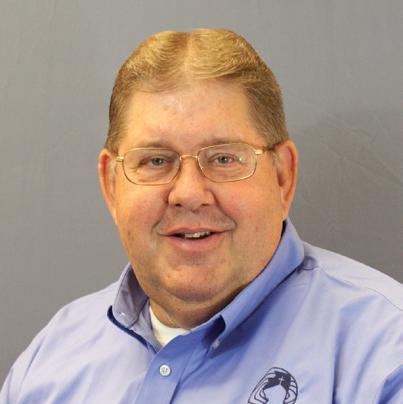
AI know very few pastors who like discussing their compensation package with the personnel or finance committee. But churches have an obligation to meet the financial needs of their pastor and staff members, who in turn have a responsibility to provide for their families. Few church members think about salaries, insurance, retirement, taxes, and various allowances—except once a year, during the budget presentation. And if the question isn’t raised concerning an increase, another year passes, and hard feelings can surface.
GuideStone Financial Resources publishes a booklet detailing the average salary range for Southern Baptist pastors and staff according to church size and location. I would suggest you request this free resource and give it to the chairperson of your personnel committee. They might discover that you are underpaid and make an adjustment. Don’t allow Satan to use your pay package as a point of contention which will only cause you to become bitter (see Proverbs 3:5-6).
A lotto trouble
One of our members won the lottery. Before she won, church members criticized her for playing. Now they want to know when to expect her tithe check.
Q
A 16 IBSA. org Illinois Baptist
I was a police officer and a deputy sheriff before I became a pastor, and at the law enforcement academy they taught us about “the fruit of the poisonous tree,” which was evidence that couldn’t be used in court because it had been collected or discovered through improper or illegal means.
Since the Bible discourages gambling and the love of money (see Proverbs 28:22 and 1 Timothy 6:9-10, for example), I have always believed that any money that results from gambling should be treated like poisonous fruit. The church members need to quit looking for a check from her winnings and put their trust in the Lord, the one who declares, “For every animal of the forest is mine, (and) the cattle on a thousand hills” (Psalm 50:10, HCSB). God will supply their need!
PAT PAJAK
Pat Pajak has pastored churches of all sizes across Illinois. He currently directs evangelism for IBSA. Send questions for Pat to IllinoisBaptist@ IBSA.org.
Church needed here...
KEVIN CARROTHERS
Editor’s Note: Joe Pine and Jim Gilmore told us almost 20 years ago that the next great shift in our culture would be from the Information Age to “the Experience Economy” (which was the name of their book). Well, it’s here, according to Jeremy Roberts of Church of the Highlands in Chattanooga. He offers a recent example of how his church is experiencing this shift.




































































 – IBSA Church Planting Team
– IBSA Church Planting Team

